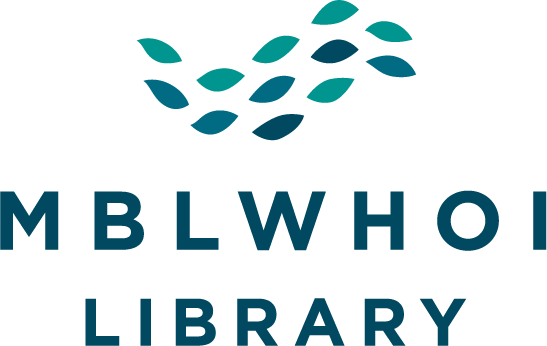WHOAS Repository Services
Mission
The mission of the Woods Hole Open Access Server, WHOAS is to capture, store, preserve, and redistribute the intellectual output of the Woods Hole scientific community in digital form. WHOAS, an institutional repository (IR), is managed by the MBLWHOI Library as a service to the Woods Hole scientific community. The scientific community includes Marine Biological Laboratory (MBL), NOAA Fisheries, Sea Education Association (SEA), Woods Hole Coastal and Marine Science Center (USGS), Woods Hole Oceanographic Institution (WHOI) and Woodwell Climate Research Center. Go to WHOAS
WHOAS is supported by the MBLWHOI Library. The IR is administered by a Repository Manager. In-house technical support is provided by the Data Librarian and the Systems Librarian.
The software platform of WHOAS is DSpace, an open source system developed jointly by MIT Libraries and Hewlett-Packard (HP). The Library contracts with an outside vendor for DSpace upgrades and customization. Learn more about DSpace.
DOI
The assignment of persistent identifiers enables accurate data citation. The Library, like most repositories can assign a Digital Object Identifier (DOI) to appropriate theses/dissertations, conference and workshop presentations, datasets, images, and publications deposited in the Institutional Repository (IR) WHOAS (Woods Hole Open Access Server).
 WHOAS is proud to be a CoreTrustSeal Certified Repository. CoreTrustSeal is an international, community based, non-governmental, and non-profit organization promoting sustainable and trustworthy data infrastructures.
WHOAS is proud to be a CoreTrustSeal Certified Repository. CoreTrustSeal is an international, community based, non-governmental, and non-profit organization promoting sustainable and trustworthy data infrastructures.
Copyright
All Items in WHOAS are protected by original copyright, with all rights reserved, unless otherwise indicated. WHOAS also supports the use of the Creative Commons licenses for original content.
Collection Policy
WHOAS accepts scholarly or research oriented work produced, submitted, or sponsored by the Woods Hole scientific community. The work must be in the final publishable state that is it must be complete and ready for "publication”. Articles, books, book chapters, theses/dissertations, conference and workshop presentations, data sets, images, etc., in a variety of formats, will be accepted for deposit. The author must have or can acquire the appropriate copyright permissions.
If you are a client of the Biological and Chemical Oceanography Data Management Office (BCO-DMO), BCO-DMO will make WHOAS submissions and acquire DOIs on your behalf. Contact info@bco-dmo.org.
Content is ingested by the MBLWHOI Library staff. Please complete:
and submit the form to whoas@whoi.edu.
An ingest interview will be scheduled after the completed form has been reviewed. The purpose of the interview is to determine the peer-review status, accessibility of files, and that sufficient documentation is provided. The metadata is created from the information in the forms. README files are required for data sets and optional for other types of deposits.
Live databases are not accepted, including any item that needs to be hosted with a web interface. A record will not function as a database. Static datasets as well as extractions from databases will be accepted. Private or sensitive data will not be allowed as WHOAS is an open access server intended for sharing data.
For curatorial reviews files are checked for completeness, common files are normalized to preferred file formats and metadata is produced. Each file must not exceed 150 GB, larger data files are considered on a case-by-case bases. To discuss larger dataset deposits, please contact us.
Content submission is permanent. DOI’s cannot be deleted. An item maybe withdrawn from view (e. g. due to a violation of the deposit agreement) but the historical record will be retained.
License
In contributing content to WHOAS, contributors grant to the MBLWHOI Library the non-exclusive right to reproduce, translate, and/or distribute submissions (including the abstract) worldwide in print and electronic format and in any current or future medium, including but not limited to audio or video. The MBLWHOI Library may, without changing the content, translate the submission to any medium or format for the purpose of preservation. Non-compliance results in the item not being deposited into WHOAS.
Statistics and metrics
Anonymous visitors to WHOAS may view usage statistics for any item in the repository. Data provided for the current six-month period include: Total Visits Per Month, File Visits, Top country views, and Top city views.
Article level metrics are available for many, though not all, items in the repository. Data are provided by Altmetric. Learn more at http://www.altmetric.com/.
Preservation Policy
The Library supports Open Access practices and whenever possible the Library makes digital data items findable and publicly accessible and offers access to reliable archival infrastructure to encourage researchers to provide open access to their data to benefit the scientific community.
The MBLWHOI Library holds the right to migrate and transform the data into other formats as data and archive technologies become obsolete. The data housed in WHOAS will be preserved at the appropriate level for at least 10 years following acceptance with the expectation of perpetuity. In effort to prevent a growing migration issue a biennial review of data objects and metadata has been implemented. We encourage researchers to use open analysis tools and formats, so that data can be preproduced from beginning to end.
Format Support
The Library promotes FAIR (findable, accessible, interoperable, and reusable) and CARE (collective benefit, authority to control, responsibility, and ethics) data resources. Good data management and curation supports FAIR principles. The Library is committed to assisting its contributors with data management.
The Library expects to provide support for as many file formats as possible. Items stored in WHOAS are preserved as is through data management and digital preservation. The proprietary nature of some file types makes it impossible to make guarantees.
When a file is uploaded to WHOAS, one of the following categories is noted:
- Supported: Format is fully supported; "make usable in the future, using whatever combination of techniques (such as migration, emulation, etc.) is appropriate given the context of need."
- Known: Format is recognized, but full support is not guaranteed; we hope to accommodate needs as they arise.
- Unsupported: Format is not recognized. It is not recommended to use unrecognized or unsupported file formats.
A number of formats are known to WHOAS; open source formats are highly recommended.
For more information, please contact the WHOAS Project Manager: whoas@whoi.edu
More Resources
README_Examples.doc
WHOAS_Browse_and_Search_Basics.pdf
WHOAS_bitstream_registry_2.pdf
WHOAS_lifecycle_workflow.pdf
WHOAS_license_0.pdf
Metadata_Application_Profile.xls
